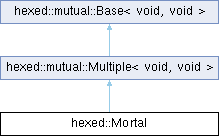represents an object that could die at any moment More...
#include <Mortal.hpp>

Additional Inherited Members | |
 Public Member Functions inherited from hexed::mutual::Multiple< void, void > Public Member Functions inherited from hexed::mutual::Multiple< void, void > | |
| Multiple (const Multiple &)=delete | |
| Multiple (Multiple &&that) | |
steals all of that's partners, leaving that unconnected | |
| Multiple & | operator= (const Multiple &)=delete |
| Multiple & | operator= (Multiple &&that) |
steals all of that's partners, leaving that unconnected | |
| next::Sequence< Base< void, void > & > | partners () |
| provides access to the list of partners | |
| next::Sequence< const Base< void, void > & > | partners () const |
| provides access to the list of partners | |
 Public Member Functions inherited from hexed::mutual::Base< void, void > Public Member Functions inherited from hexed::mutual::Base< void, void > | |
| virtual void * | _mine () |
| virtual const void * | _mine () const |
| This is an overloaded member function, provided for convenience. It differs from the above function only in what argument(s) it accepts. | |
 Protected Member Functions inherited from hexed::mutual::Base< void, void > Protected Member Functions inherited from hexed::mutual::Base< void, void > | |
| void | _connect (Base< void, void > &that) |
may be overridden by derived classes to provide partners to data of some arbitrary type T | |
| void | _disconnect (Base< void, void > &that) |
mutually disconnects this and that by calling both of their _unset() member functions | |
 Static Protected Member Functions inherited from hexed::mutual::Base< void, void > Static Protected Member Functions inherited from hexed::mutual::Base< void, void > | |
| static void * | _yours (Base< void, void > &that) |
Accesses the _mine() of that | |
| static const void * | _yours (const Base< void, void > &that) |
| This is an overloaded member function, provided for convenience. It differs from the above function only in what argument(s) it accepts. | |
 Protected Attributes inherited from hexed::mutual::Base< void, void > Protected Attributes inherited from hexed::mutual::Base< void, void > | |
| Lock | _lock |
represents an object that could die at any moment
As described in the documentation for the mutual namespace, sometimes it is useful to have pointers to an object, where when that object is destroyed or moved the pointers are updated. You can obtain this by deriving a class from Mortal and creating Mortal_ptrs to it.
Mortal to an object of a different type. This is undefined behavior. For example, the following is illegal: However, the following is OK: